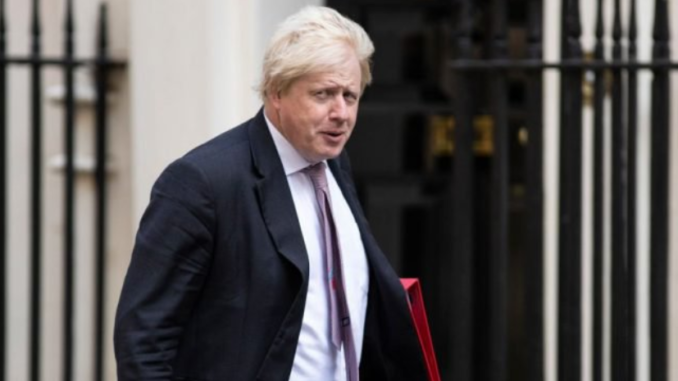
British Prime Minister Boris Johnson unveils his Conservative Party’s manifesto on Sunday, pledging to move on from Brexit and austerity in a bid to secure a general election majority.
Having taken over a minority administration in July and been unable to speed his EU divorce deal through parliament, Johnson is seeking a clear victory at the December 12 snap election.
He sees Britain’s third general election in four-and-a-half years as the only way to break the Brexit logjam.
Having got the Brexit date delayed three months from October 31 to January 31, opposition parties backed his call for an early general election.
READ ALSO: Two dead, one missing after rainstorms drench France
Johnson is promising to bring back his Brexit deal to parliament before December 25 if the centre-right Conservatives are returned to power.
“As families sit down to carve up their turkeys this Christmas, I want them to enjoy their festive-season free from the seemingly unending Brexit box-set drama,” Johnson said ahead of the launch.
“The Conservative manifesto, which I’m proud to launch today, will get Brexit done and allow us to move on and unleash the potential of the whole country,” he said.
– ‘Oven-ready’ Brexit deal –
The main plank of the Conservative manifesto is the Brexit deal Johnson negotiated with Brussels in October. He claims the treaty is “oven-ready” and good to go — as long as he can get a majority.
He insists the deal will allow Britain to regain control over its laws, money and immigration policy.
Johnson’s chief rival, left-wing Labour leader Jeremy Corbyn, wants to renegotiate a new, softer Brexit agreement within three months and then put that to a referendum alongside remaining in the EU by the end of June. Corbyn would stay neutral during the process.
Johnson has blasted Corbyn for his strategy in refusing to recommend either his own proposed Brexit deal or staying in the EU.
Johnson tweeted: “It’s time to turn the page from the dither, delay and division of recent years, and start a new chapter in the incredible history of this country.
“We have achieved amazing things together in the past, and I know we will achieve even more in the future — if only we choose the right path at this critical election.”
The party is pledging it will not raise the three main taxes — income tax, sales tax and national insurance contributions to state benefits — in what it branded a triple tax lock.
Other measures being unveiled Sunday include more money for childcare support, energy efficiency measures, skills retraining and road upgrades.
Hospital car parking charges would be axed for certain patients and the National Health Service staff.
– Poll lead –
Britain Elects poll aggregator puts the Conservatives on 42 per cent, ahead of the Labour main opposition on 29 per cent, the anti-Brexit Liberal Democrats on 15 per cent, the Brexit Party on six per cent and the Greens on three per cent.
The Conservatives have seen their popularity surge since Johnson took over from Theresa May four months ago.
Despite the poll advantage, commentators urge caution, mindful that May had a huge percentage lead in the 2017 general election which rapidly melted.
Johnson has his weak spots, especially after the years of austerity imposed by Conservative governments since 2010.
He promises to end the years of reining in the budget deficit by pumping billions of pounds into public services.
Johnson has pledged to make the streets safer by recruiting 20,000 police officers.
He is also committed to increasing the NHS budget by £33.9 billion ($43.5 billion, 39.5 billion euros) by 2023-24, and has pledged to upgrade 20 hospitals and rebuild 40 over the next decade.
Johnson was criticised by members of the public during a televised questions session on Friday over the Conservatives’ handling of the NHS — but he insisted progress could only be made once the Brexit impasse is resolved.
Johnson has announced a three-year plan to increase state-school spending in England by £7.1 billion by 2022-23.
On immigration, he wants to end freedom of movement for EU citizens and introduce an Australian-style points-based system.
The scale of eastern European immigration since 2004 was one of the key factors behind the Brexit referendum vote in 2016.
(AFP)
END

Be the first to comment